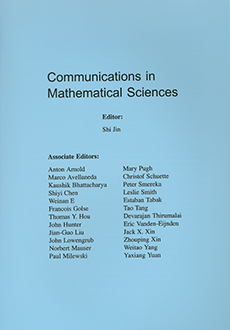Abstract
A nonlinear, nonlocal cochlear model of the transmission line type is studied in order to capture the multitone interactions and resulting tonal suppression effects. The model can serve as a module for voice signal processing, and is a one-dimensional (in space) damped dispersive nonlinear PDE based on the mechanics and phenomenology of hearing. It describes the motion of the basilar membrane (BM0 in the cochlea driven by input pressure waves. Both elastic dampling and selective longitudinal fluid damping are present. The forner is nonlinear and nonlocal in BM displacement, and plays a kep role in capturing tonal interactions. The latter is active only near the exit boundary (helicotrema), and is built in to damp out the remaining long waves. The initial boundary value problem is numerically solved with a semi-implicit second order finite difference method. Solutions reach a multi-frequency quai-steady state. Numerical results are shown on two tone suppression. Suppression effects among three tones are demonstrated by showing how the response magnitudes of the fixed two tones are reduced as we vary the third tone in frequency and amplitude. We observe qualitative agreement of our model solutions with exisiting cat auditory neural data. The model is thus a simple and efficient processing tool for voice signals.
Citation
Li Deng. Yingyong Qi. Jack Xin. "Time Domain Computation of a Nonlinear Nonlocal Cochlear Model with Applications to Multitone Interaction in Hearing." Commun. Math. Sci. 1 (2) 211 - 227, June 2003.
Information





